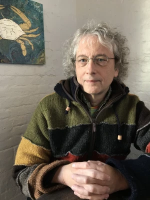For Baltimore County Executive Johnny Olszewski, the collapse of the Key Bridge is more than just a monumental challenge for his administration.
WYPR’s John Lee talked to Olszewski Monday about growing up in Dundalk, where the Key Bridge always loomed large, and the challenges ahead.
Lee: It's been part of your life your entire life. Tell me about that. What are your memories of the bridge growing up?
Olszewski: The bridge is just a part of our culture, it's been a part of our lives, literally as far back as I can remember.
For me, it's not just the iconic views of what the bridge looked like. But it's everything from the rites of passage of driving around the bridge, just because we can when we get our driver's license, evening fishing expeditions underneath and around the bridge. It's safe to say that even as we first and foremost are mourning the losses of our neighbors who were working on that bridge, as we share our concern for our other neighbors who are dock workers or small business owners or truck drivers who relied on that bridge, we also are mourning the loss of something that I think you really can't put words around. And it's a very personal and it's a deeply painful kind of feeling that I know that countless others are still grappling with.
Lee: I was going to ask you about that. Certainly over the past week, you've been talking to your constituents, really your neighbors in Dundalk. What have you been hearing from them?
Olszewski: It's all the stages of processing, right? I mean, I think about people like Butch Henry, a very good friend of mine, known him for a very long time, literally helped build the bridge as an iron worker. You think about my cousin Warren, who works at the Port of Baltimore, and I just saw earlier today with other members of the ILA and the uncertainty around the livelihood.
I don't think you can undersell just how connected this region is. And it's brought us, I think together in a way that even I'm surprised by knowing how close and tight knit this community is. But many of us are lucky that it's just the inconvenience of the traffic and the emotional toll and loss of, you know, having that emptiness in the sky. Even as we're grappling with that, we know that there were hardworking individuals whose families are reeling in a whole different sort of way, who are also our neighbors who lost those family members that day. There are untold families who are staring down incredible uncertainty, including an unknown timeline as to how long it will take before they'll get back to work at the Port of Baltimore. This is such an interconnected thing that, you know, even as the world is watching, and even as we acknowledge that this has national and international implications in terms of supply chain in terms of economic output, it's still very real and very personal. And all those things can be true at once. But trying to process and work through all those things is something that I've never done before.
Lee: What is the county planning on doing to help the county residents, both the ones who are affected directly by this and also business people?
Olszewski: Whatever it takes. It's what local government does, we fill in the gaps. And so as we coordinate with our partners, the federal and state level, we will see the federal resources. We will see the state resources and then wherever there are gaps in that we're ready to step in.



